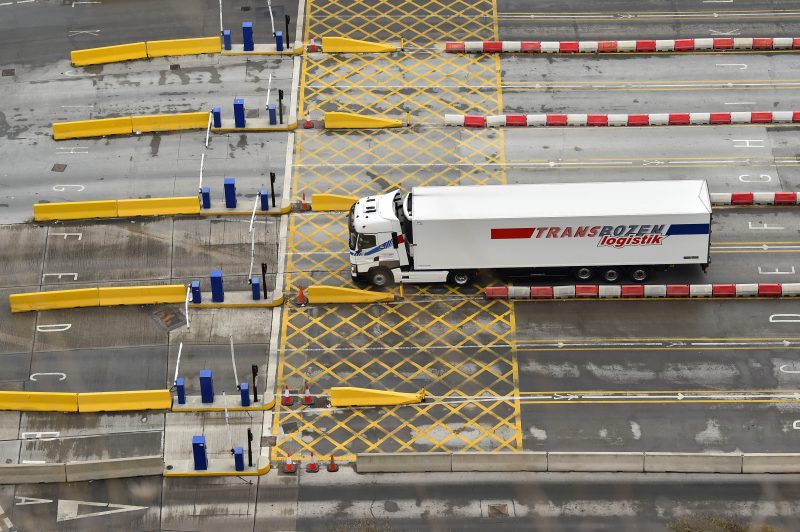Britain eyes Brexit ‘no-deal’ trade shift to China
A “no deal” Brexit could see long queues of lorries at ports like Dover (GLYN KIRK)
London (AFP) – Britain on Wednesday unveiled a contingency trade policy that favours global giants such as China over EU countries in case of a messy divorce from the bloc.
London is bracing for the worst as it races toward the March 29 Brexit deadline without a plan for unwinding its 46-year involvement in the European project.
A sudden “no-deal” split would see an end to the current free trade arrangements between Britain and its EU partners overnight.
The government said it would mitigate the damage on businesses and consumers by eliminating customs duties on 87 percent of the imports into the United Kingdom.
The measure would have to apply to all countries — both EU and non-EU — because of global trade rules.
Analysts said the current figure stands at around 80 percent — much of it enjoyed by the 27 EU nations.
An increase in the total amount of tariff-free imports “will probably mean EU producers lose out to Chinese and other lower-cost producers,” said David Hening of the European Centre For International Political Economy.
Hening predicted a “trade diversion from the EU”.
But the proposals for tariff-free imports contained exceptions for sensitive industries — particularly farming and the automotive industry.
Here is a look at how three of Britain’s most important sectors will fare in the 12-month window over which the measures would be rolled out initially:
– Fair for farmers? –
Most nations protect their farmers to at least some extent because of their social importance.
Britain would keep “tariffs and quotas on beef, lamb, pork, poultry and some dairy to support farmers and producers who have historically been protected through high EU tariffs”, according to a UK government statement.
This sparked an immediate outcry from Ireland — a UK-focused food producer in which almost one in ten people work in the agri-food sector.
Its agriculture ministry warned that Dublin might respond through “traditional market support” — a euphemism for reciprocal tariffs and quotas — and “increased flexibility under state aid regulations”.
– Steel spat –
Britain’s shift of attention to China is most vividly displayed by the complete elimination of tariffs on its massive aluminium and steel mills.
The benefits would also stretch to big metals producer Russia — a potentially sensitive issue considering the chilly state of London’s affairs with Moscow.
UK steel producers would suffer in manufacturing cities that voted for Brexit and disproportionately feel the impact of the new trade approach.
These factors could compound Theresa May’s political problems in the first weeks of a full-blown “no-deal Brexit” crisis.
– Wheel woes –
Cheaper metals are a boon for Britain’s troubled car producers. The sector is a vital employer in smaller cities and will get the additional help thanks to tariff-free imports of components.
But any boost could be countered if the EU reacts with protectionist tariffs of its own, as is likely although Brussels has set out no official “no-deal” trade policy.
Analysts said they expected the price of German and French cars in Britain to jump by 10 percent as a result of the new tariff plan.
Britain’s proud bike producers, meanwhile, complained they would lose out as the government proposals would reduce tariffs on bicycle imports.
Britain’s Bicycle Association says the industry employs twice as many people as the steel sector and is worth three times more.
“UK bike makers are particularly badly hit as anti-dumping duties and tariffs have been removed, and they will face tariffs in overseas markets,” said Hening.
Disclaimer: This story is published from a syndicated feed. Siliconeer does not assume any liability for the above story. Validity of the above story is for 7 Days from original date of publishing. Content copyright AFP.


